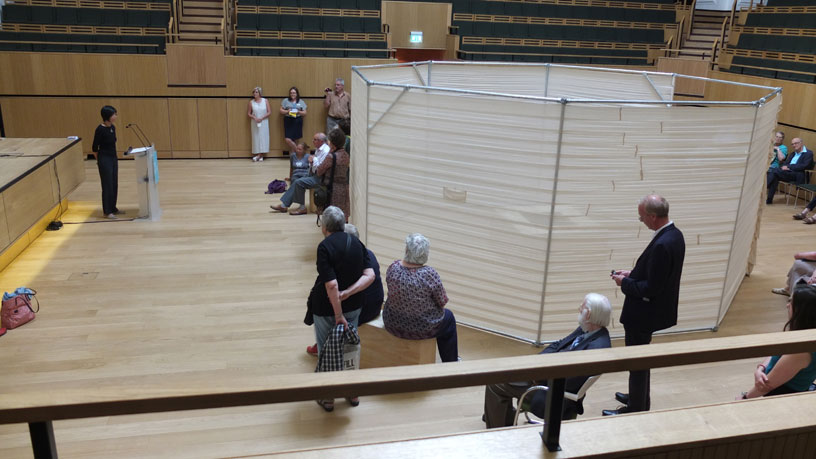Breaking the cycle of violence
Beekeepers and market gardeners, university lecturers, teachers and men who left school aged twelve, doctors, printers and politicians, were conscientious objectors (COs) in World War I (WWI). Their courage – and the global plight of COs today – has inspired an art exhibition in London, set in a chamber resembling a WWI field tent made of bandages.

Created by Quaker Arts Network, the sound installation and photography project, Echo Chamber, runs from 18 August to 2 September, at Friends House, the central offices of Quakers in Britain. Open daily, 11.00am till 4.00pm, except Bank Holiday Monday.
The free exhibition marks the centenary of the Military Service Act, which brought in both conscription and the right to refuse to fight, on the grounds of conscience. Quaker MPs worked to get the conscience clause into the Act. Quakers were among 16,000 conscientious objectors in WWI.
At the launch this week, artist Fiona Kam Meadley, said, “What they had was the inner strength to listen to their conscience and pay the price, sacrificing their prospects and for some, their own lives." Jane Dawson of Quakers in Britain, spoke of the Quaker faith that regards each life as sacred leading the COs to refuse to kill.
The Gloucestershire artists Fiona Kam Meadley, Dominic Thomas and Ruth Davey spoke about conscientious objectors “breaking the cycle of violence".
[QUOTE-START]
They had an inner strength to listen to their conscience and pay the price.
- Fiona Kam Meadley
[QUOTE-END]
Conscientious objection to military service is now recognised as a human right at United Nations and European levels. Hannah Brock of War Resisters International says not all countries yet apply the law.
As well as recorded interviews, family photos feature in Echo Chamber. Several generations came to mark the COs' principled stand. Donald Saunders spoke of his father and uncle's courts martial and hard labour in prison, as well as the insults and vilification suffered by his mother.
- On Saturday 27 August at 2.00pm Fiona Meadley will be in conversation with poet Philip Gross. On Saturday 20 August from 1.00pm till 3.00pm there is a drop-in workshop for children and young people.
The exhibition is sponsored by Arts Council England, The Sir James Reckitt Charity, Edith M Ellis Charitable Trust and Stroud Valleys Artspace, with special thanks to the Imperial War Museum.